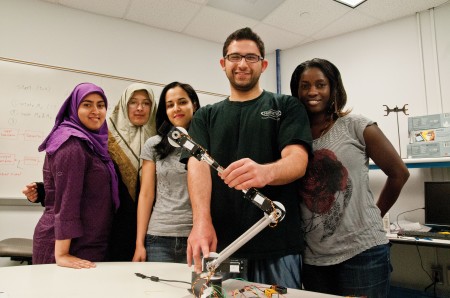Nathalia Peixoto, assistant professor of electrical and computer engineering, loves to build things and watch her students do the same.
“Most professors want to lecture,” Peixoto said. “But I want to build something — or maybe destroy something and then fix it.”
Peixoto is one of seven faculty members involved in George Mason University’s bioengineering program, which started in July 2011. Currently, she runs the neural engineering lab on campus.
Peixoto has lived in the United States for the last 10 years, but she earned her master’s degree in her native Brazil at a university she describes as lecture-based and very traditional. Peixoto emphasized that she would much rather study engineering independently through a hands-on approach.
“I was a little bit rebellious,” Peixoto said.
Peixoto compares her graduate education in Brazil to sports training.
“It was a lot of practice, but I wanted to play ball,” she said.
Peixoto said she considers teaching students to be the most fulfilling aspect of her work.
“It’s interesting to see students developing new ideas,” Peixoto said. “If students’ thoughts go in all directions, I try to focus them. And if students’ ideas are too focused, I try to spread them apart.”
Peixoto is proud of her undergraduate students’ efforts, which demonstrate creativity and innovation. One undergraduate student, for example, designed a “smart pen,” which contains an accelerometer that detects hand movement or lack thereof.
“If you dozed off in class or stopped underlining notes, the pen would vibrate and awaken you,” Peixoto said.
No matter how satisfying Peixoto says she finds her job, it sometimes seems there are not enough hours in the day for her to finish all of her tasks.
“I usually arrive to Mason at 7 a.m. and return home at 10 p.m.,” Peixoto said. “I feel like an airline — completely overbooked.”
Peixoto encourages more undergraduates to become involved in bioengineering research.
Specifically, she suggests interested students speak with any faculty member in the bioengineering program about the possibility of collaboration through the on-campus Undergraduate Research Scholars Program, which offers a part-time stipend of $1,000 and a full-time stipend of $4,000. The online application deadline is April 16.
Students can also join the Bioengineering Society, which Peixoto advises.
For more information, visit the neural engineering lab’s website at complex.gmu.edu/people/peixoto/index.html
Students can also look up “Mason Bioengineering” on Facebook, or visit the neural engineering lab’s YouTube channel.







Comments